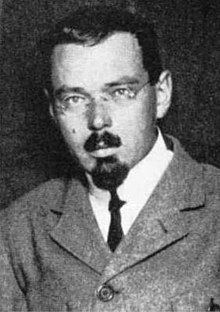Karl Schmidt-Rottluff
Jump to navigation
Jump to search

Karl Schmidt-Rottluff (1 December 1884 – 10 August 1976) was a German Expressionist painter and print-maker; participating as young artist in the German artist group Die Brücke.
Quotes[edit]

- To get straight to the point, the local group of artist called Die Brücke would reckon it a high honour to be able to welcome you as a member. Of course you will know as little about Die Brücke as we knew about you before your exhibition at [Arnold’s [gallery Arnold at Dresden. Now, one of the aims of Die Brücke is to attract all the revolutionary and fermenting elements to itself – that’s the meaning of the name Brücke. The group also arranges several exhibitions a year, which it sends on tour in Germany.. .Now, dear Herr Nolde, think as you like and what you like, we hope this offer is the proper price for your tempests of colour.
- In a letter of Schmidt-Rottluff from Dresden, 1906 to Emil Nolde; as quoted in Expressionism, de:Wolf-Dieter Dube; Praeger Publishers, New York, 1973, p. 32
- Schmidt-Rottluff was one of the founders of Die Brücke and invited Emil Nolde to participate, and emphasized the group's spirit of experimentation which they recognized in Nolde's painting art
- I know of no 'new programme'.. .Only that art is forever manifesting itself in new forms, since there are forever new personalities – its essence can never alter, I believe. Perhaps I am wrong. But speaking for myself, I know that I have no programme, only the unaccountable longing to grasp what I see and feel, and to find the purest means of expressing for it.
- In the periodical 'Kunst und Künstler', 1914; as quoted in Expressionism', de:Wolf-Dieter Dube; Praeger Publishers, New York, 1973, p. 20
- The essence of art can never change. I'm convinced you can't talk about art. At best, you will have a translation, a poetic paraphrase, & as for that I'll leave that to the poets.
- In: New Program - Kunst & Kunstler, Berlin 1914
- On occasion I came to exaggerate certain forms, in violation of scientific proportion but in accordance with the balance of their spiritual relationships to each other. I made heads vastly oversized in relation to other parts of the body, because the head is the point of concentration of all the psyche, all expression.
- In Gerhard Wietek, Schmidt-Rottluff: Graphik, Verlag Karl Thiemig, Munich, 1971, p. 100; as quoted in 'Portfolios', Alexander Dückers; in German Expressionist Prints and Drawings - Essays Vol 1.; published by Museum Associates, Los Angeles County Museum of Art, California & Prestel-Verlag, Germany, 1986, p. 111
- ..we didn't have the intention at all of founding a new style.. .What we wanted, was a refusal of the outmoded, overly-cultivated art practices.
- as quoted in Ernst Ludwig Kirchner und Die 'Brücke: Selbstbildnisse, Künstlerbildnisse, Jutta Hülsewig-Johnen & Egging Björn; Kerber, Bielefeld 2005, p. 174; as quoted by Louise Albiez (incl. translation), Brücke und Berlin: 100 Jahre Expressionismus; submitted to the Division of Humanities New College of Florida, Sarasota, Florida, May, 2013 p. 9
- The atelier was under the roof. Inhabiting this space was forbidden due to fire code restrictions, but staying and working there was allowed. We therefore had to avoid the impression that these were our living quarters. The most necessary furniture had to disappear into the attic during the day. And so the place was decorated purely with curtains. A curtain hung in front of the entrance door, a second one in front of the oven heating.. ..an adjoining room was hidden by a curtain with abstractedly patterned batik.
- In: Brücke und Berlin: 100 Jahre Expressionismus, Anita Beloubek-Hammer, ed.; Berlin: Nicolaische Verlagsbuchhandlung, Berlin 2005, p. 312 (https://www.researchgate.net/publication/272168564 translation, Claire Louise Albiez]
- In addition to defying societal standards, die Brücke artists defied housing laws: the ateliers in Dresden that they worked and lived in were forbidden to be used as homes
Quotes about Karl Schmidt-Rottluff[edit]
- The bracing air of the North Sea brought out a monumental impressionism, especially in Schmidt-Rottluff.. ..[a pictorial unity] which actually lives more through the artist's obsession than through the definition of the subject.
- Ernst Ludwig Kirchner, in his 'Chronik der Brücke' (chronicle of the 'Brücke'), 1913; as quoted by de:Wolf-Dieter Dube, in Expressionism, de:Wolf-Dieter Dube; Praeger Publishers, New York, 1973, p. 64
- He returned from the field altered [of World War 1.], but the new impulse came less out of political and social revolution than.. ..out of the assurance that there existed a tie to the numinous, the sacred, the religious.. .He gives the old symbols new content through human bearing and transforms them into symbolic terms of expression with contemporary appeal.. .What he painted in 1919 and 1920 was born out of the sense of being near death and again being given the gift of life.
- Will Grohmann, in Karl Schmidt-Rottluff, W. Kohlhammer, Stuttgart: 1956, pp. 90, 92; as quoted in 'The Revival of Printmaking in Germany', I. K. Rigby; in German Expressionist Prints and Drawings - Essays Vol 1.; published by Museum Associates, Los Angeles County Museum of Art, California & Prestel-Verlag, Germany, 1986, p. 46
- Schmidt-Rottluff viewed the city as an endless reservoir of artistic impulses, being inspired by the exhibits of the international Avant-Garde, Cubism, Futurism, and African artifacts. His 1912 ' Häuser bei Nacht' (Houses by Night) reveals this Cubist influence, in its solid construction of forms and patches of color. Simultaneously, it presents Die Brücke's new mindset of city life. The houses are sharp, ascend upwards crookedly, and seem ominous. Schmidt-Rottluff utilizes the primary colors that were so common for the group but gives them a gloomy and almost threatening tone here.
- Claire Louise Albiez, in: Brücke und Berlin: 100 Jahre Expressionismus; submitted to the Division of Humanities New College of Florida, Sarasota, Florida, May 2013, p. 50-51

